Unit 1 Topic 2 I'll kick you the ball again.重点知识讲义 仁爱版英语八年级上册
文档属性
| 名称 | Unit 1 Topic 2 I'll kick you the ball again.重点知识讲义 仁爱版英语八年级上册 | 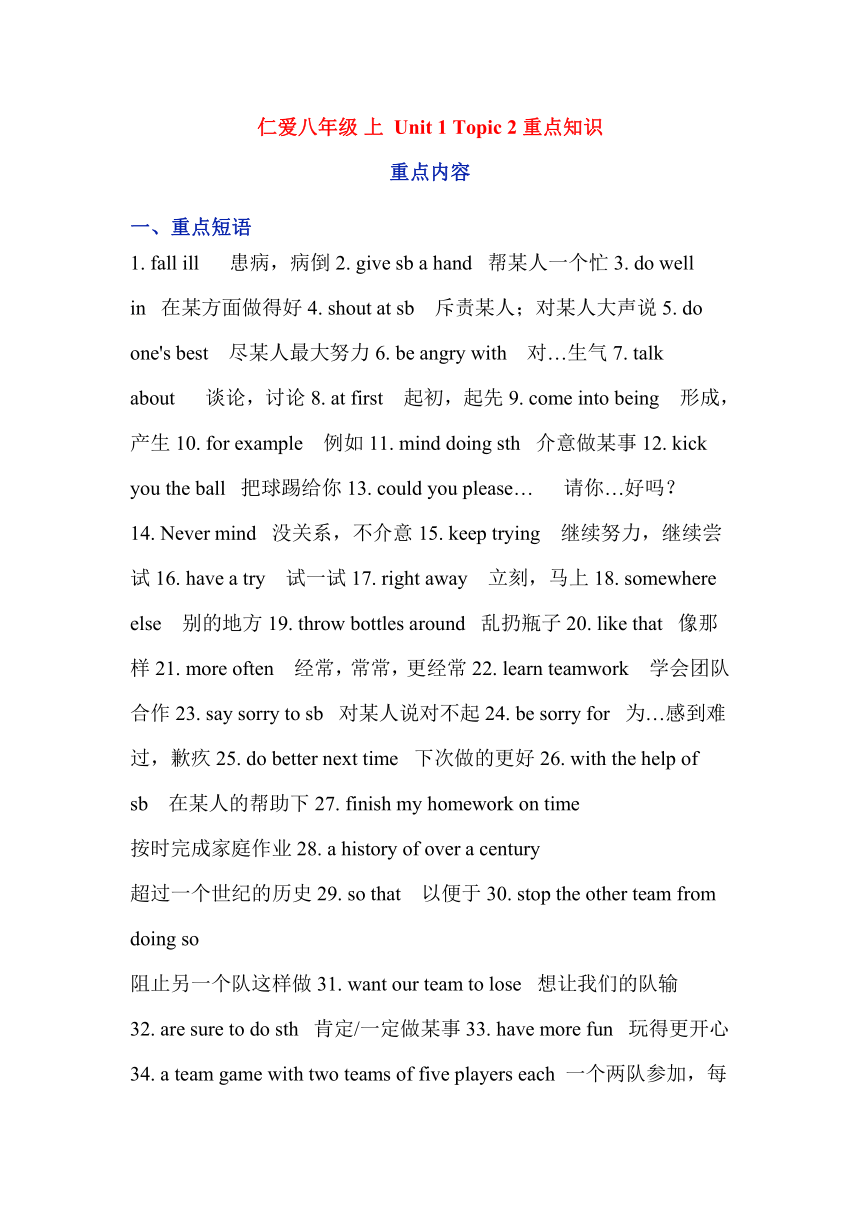 | |
| 格式 | docx | ||
| 文件大小 | 37.9KB | ||
| 资源类型 | 教案 | ||
| 版本资源 | 仁爱科普版 | ||
| 科目 | 英语 | ||
| 更新时间 | 2024-12-30 17:53:40 | ||
图片预览

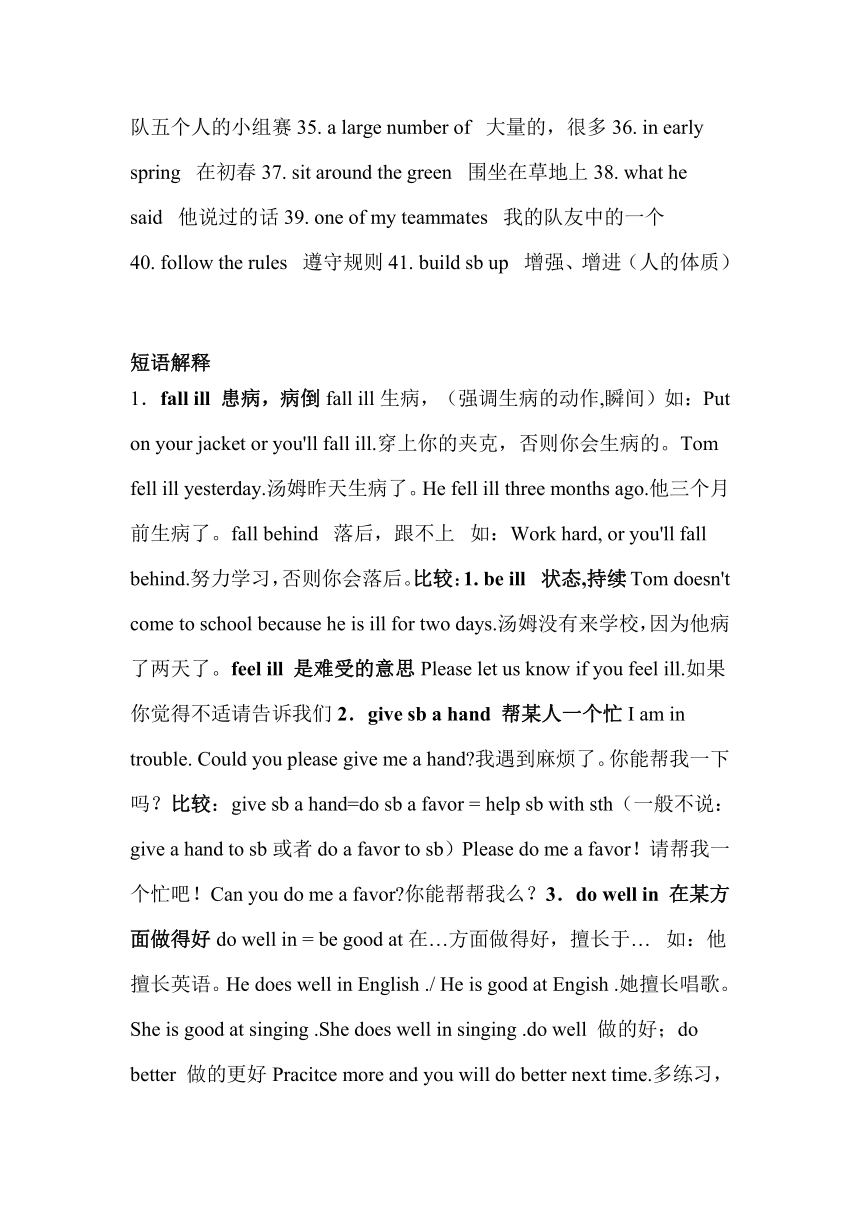
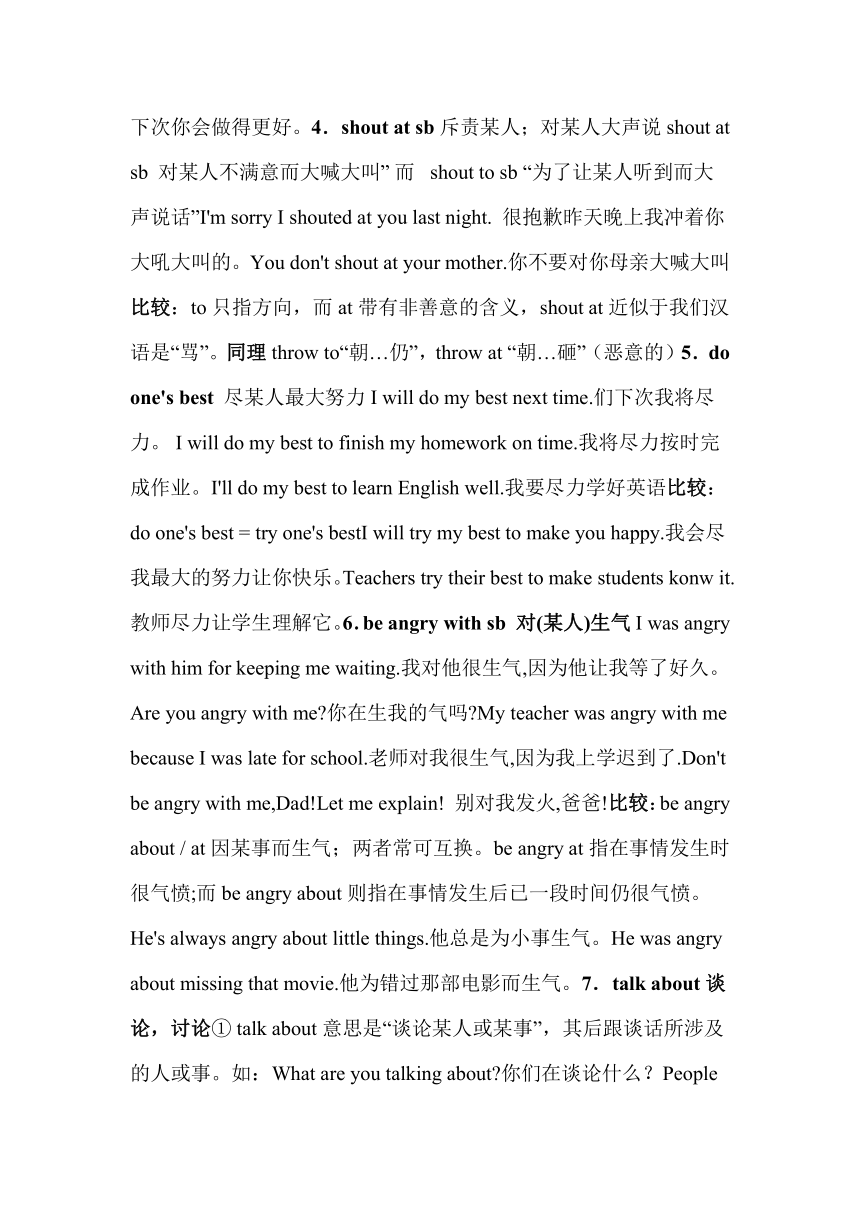
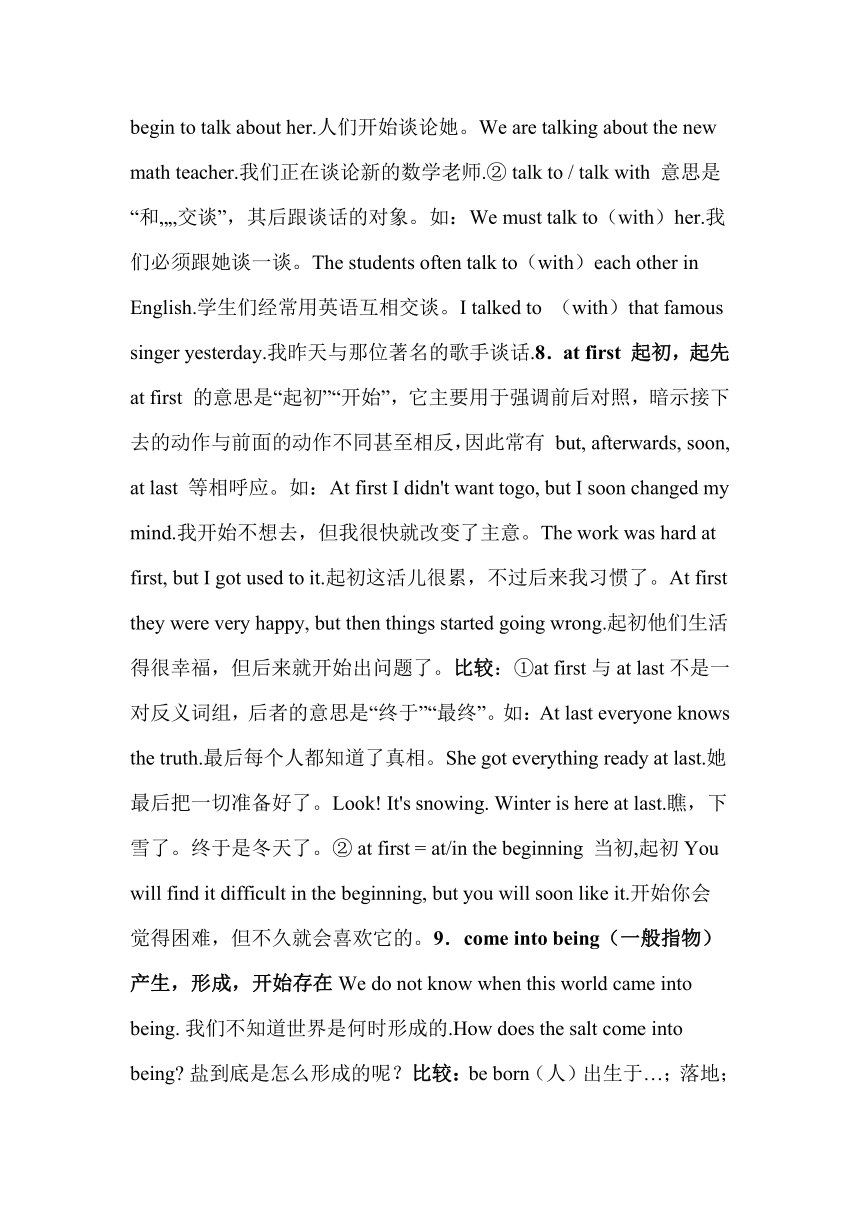
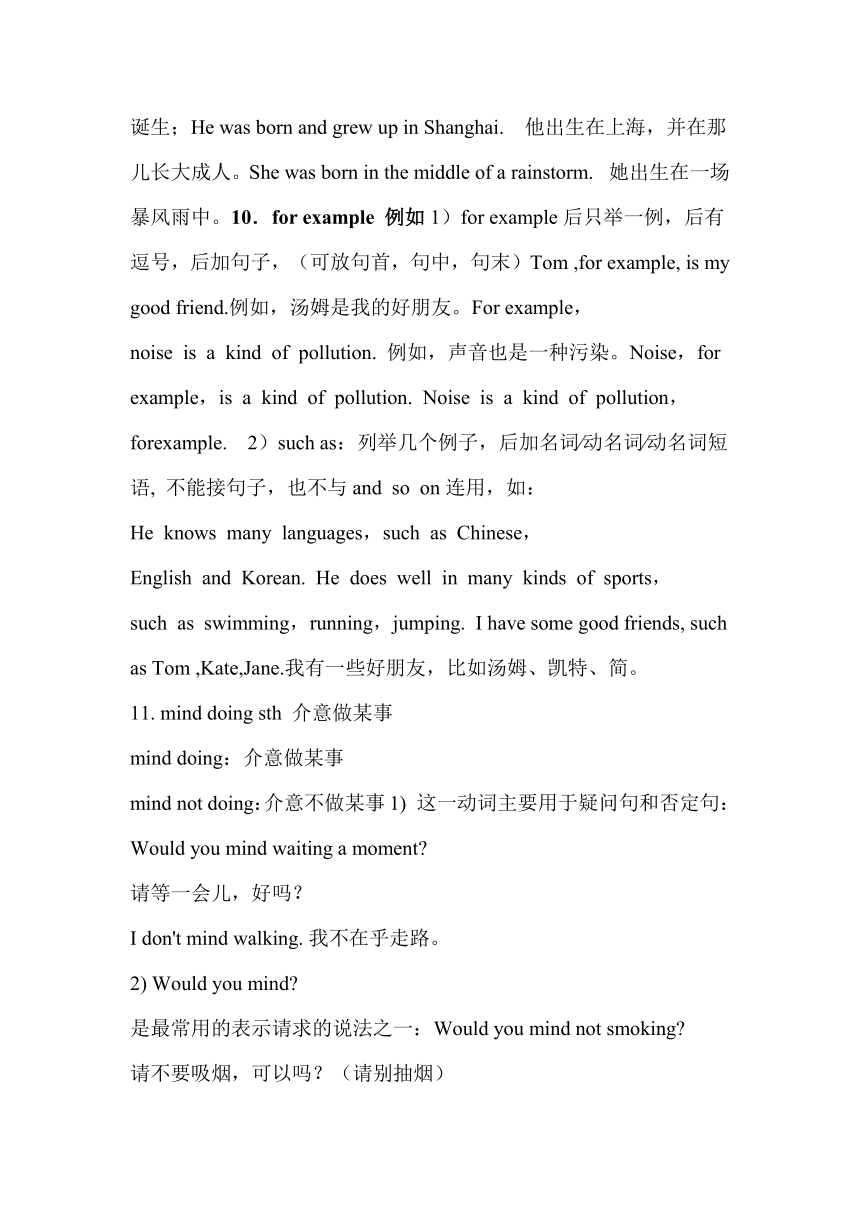
文档简介
仁爱八年级 上 Unit 1 Topic 2重点知识
重点内容
一、重点短语
1. fall ill 患病,病倒2. give sb a hand 帮某人一个忙3. do well in 在某方面做得好4. shout at sb 斥责某人;对某人大声说5. do one's best 尽某人最大努力6. be angry with 对…生气7. talk about 谈论,讨论8. at first 起初,起先9. come into being 形成,产生10. for example 例如11. mind doing sth 介意做某事12. kick you the ball 把球踢给你13. could you please… 请你…好吗?14. Never mind 没关系,不介意15. keep trying 继续努力,继续尝试16. have a try 试一试17. right away 立刻,马上18. somewhere else 别的地方19. throw bottles around 乱扔瓶子20. like that 像那样21. more often 经常,常常,更经常22. learn teamwork 学会团队合作23. say sorry to sb 对某人说对不起24. be sorry for 为…感到难过,歉疚25. do better next time 下次做的更好26. with the help of sb 在某人的帮助下27. finish my homework on time
按时完成家庭作业28. a history of over a century
超过一个世纪的历史29. so that 以便于30. stop the other team from doing so
阻止另一个队这样做31. want our team to lose 想让我们的队输32. are sure to do sth 肯定/一定做某事33. have more fun 玩得更开心34. a team game with two teams of five players each 一个两队参加,每队五个人的小组赛 35. a large number of 大量的,很多36. in early spring 在初春37. sit around the green 围坐在草地上38. what he said 他说过的话39. one of my teammates 我的队友中的一个40. follow the rules 遵守规则41. build sb up 增强、增进(人的体质)
短语解释
fall ill 患病,病倒 fall ill生病,(强调生病的动作,瞬间)如:Put on your jacket or you'll fall ill.穿上你的夹克,否则你会生病的。Tom fell ill yesterday.汤姆昨天生病了。He fell ill three months ago.他三个月前生病了。fall behind 落后,跟不上 如:Work hard, or you'll fall behind.努力学习,否则你会落后。比较:1. be ill 状态,持续Tom doesn't come to school because he is ill for two days.汤姆没有来学校,因为他病了两天了。feel ill 是难受的意思 Please let us know if you feel ill.如果你觉得不适请告诉我们2.give sb a hand 帮某人一个忙 I am in trouble. Could you please give me a hand 我遇到麻烦了。你能帮我一下吗?比较:give sb a hand=do sb a favor = help sb with sth(一般不说:give a hand to sb或者do a favor to sb)Please do me a favor!请帮我一个忙吧!Can you do me a favor 你能帮帮我么?3.do well in 在某方面做得好do well in = be good at在…方面做得好,擅长于… 如:他擅长英语。He does well in English ./ He is good at Engish .她擅长唱歌。She is good at singing .She does well in singing .do well 做的好;do better 做的更好Pracitce more and you will do better next time.多练习,下次你会做得更好。4.shout at sb斥责某人;对某人大声说shout at sb 对某人不满意而大喊大叫” 而 shout to sb “为了让某人听到而大声说话”I'm sorry I shouted at you last night. 很抱歉昨天晚上我冲着你大吼大叫的。You don't shout at your mother.你不要对你母亲大喊大叫比较:to只指方向,而at带有非善意的含义,shout at近似于我们汉语是“骂”。同理throw to“朝…仍”,throw at “朝…砸”(恶意的)5.do one's best 尽某人最大努力I will do my best next time.们下次我将尽力。 I will do my best to finish my homework on time.我将尽力按时完成作业。I'll do my best to learn English well.我要尽力学好英语比较:
do one's best = try one's bestI will try my best to make you happy.我会尽我最大的努力让你快乐。Teachers try their best to make students konw it.教师尽力让学生理解它。6.be angry with sb 对(某人)生气I was angry with him for keeping me waiting.我对他很生气,因为他让我等了好久。Are you angry with me 你在生我的气吗 My teacher was angry with me because I was late for school.老师对我很生气,因为我上学迟到了.Don't be angry with me,Dad!Let me explain! 别对我发火,爸爸!比较:be angry about / at因某事而生气;两者常可互换。be angry at指在事情发生时很气愤;而be angry about则指在事情发生后已一段时间仍很气愤。He's always angry about little things.他总是为小事生气。He was angry about missing that movie.他为错过那部电影而生气。7.talk about谈论,讨论① talk about意思是“谈论某人或某事”,其后跟谈话所涉及的人或事。如:What are you talking about 你们在谈论什么?People begin to talk about her.人们开始谈论她。We are talking about the new math teacher.我们正在谈论新的数学老师.② talk to / talk with 意思是“和 交谈”,其后跟谈话的对象。如:We must talk to(with)her.我们必须跟她谈一谈。The students often talk to(with)each other in English.学生们经常用英语互相交谈。I talked to (with)that famous singer yesterday.我昨天与那位著名的歌手谈话.8.at first 起初,起先at first 的意思是“起初”“开始”,它主要用于强调前后对照,暗示接下去的动作与前面的动作不同甚至相反,因此常有 but, afterwards, soon, at last 等相呼应。如:At first I didn't want togo, but I soon changed my mind.我开始不想去,但我很快就改变了主意。The work was hard at first, but I got used to it.起初这活儿很累,不过后来我习惯了。At first they were very happy, but then things started going wrong.起初他们生活得很幸福,但后来就开始出问题了。比较:①at first与at last不是一对反义词组,后者的意思是“终于”“最终”。如:At last everyone knows the truth.最后每个人都知道了真相。She got everything ready at last.她最后把一切准备好了。Look! It's snowing. Winter is here at last.瞧,下雪了。终于是冬天了。② at first = at/in the beginning 当初,起初You will find it difficult in the beginning, but you will soon like it.开始你会觉得困难,但不久就会喜欢它的。9.come into being(一般指物)产生,形成,开始存在We do not know when this world came into being. 我们不知道世界是何时形成的.How does the salt come into being 盐到底是怎么形成的呢?比较:be born(人)出生于…;落地;诞生;He was born and grew up in Shanghai. 他出生在上海,并在那儿长大成人。She was born in the middle of a rainstorm. 她出生在一场暴风雨中。10.for example 例如1)for example后只举一例,后有逗号,后加句子,(可放句首,句中,句末)Tom ,for example, is my good friend.例如,汤姆是我的好朋友。For example,noise is a kind of pollution. 例如,声音也是一种污染。Noise,for example,is a kind of pollution. Noise is a kind of pollution,forexample. 2)such as:列举几个例子,后加名词∕动名词∕动名词短语, 不能接句子,也不与and so on连用,如:He knows many languages,such as Chinese,English and Korean. He does well in many kinds of sports,such as swimming,running,jumping. I have some good friends, such as Tom ,Kate,Jane.我有一些好朋友,比如汤姆、凯特、简。
11. mind doing sth 介意做某事
mind doing:介意做某事
mind not doing:介意不做某事1) 这一动词主要用于疑问句和否定句:Would you mind waiting a moment
请等一会儿,好吗?
I don't mind walking. 我不在乎走路。
2) Would you mind
是最常用的表示请求的说法之一:Would you mind not smoking
请不要吸烟,可以吗?(请别抽烟)
Would you mind moving your car 请你把你的汽车移动一下,好吗?(请挪动它。)
1.若表示“不介意”或“同意”时,常用否定形式。如:①No,of course not.
②No,certainly not.③No,not at all.2.若表示“介意”或“不同意”时,则常用较委婉的方式加以拒绝。如:① I'm sorry but I do.② Sorry, you'd better not.③ I'm afraid you can't. 12.kick you the ball 把球踢给你
kick sb sth = kick sth to sb 把某物踢给某人I kick the ball to you like this. 我把球踢给你。Don't kick me the ball like that.
不要那样把球踢给我。类似的符合双宾语结构的词有:pass,throw,bring,show,teach,lend,give kick的其它用法:如:He kicked me! 他踢我了!He kicked the door open.
他踢开了门。
He kicked the ball hard.
他用力踢球。13.Could you please + 动词原形+其它?请你…好吗?
这种“礼貌、委婉的说法”, 不是过去式, “能否麻烦你…”、“请你…吗?” 回答要注意:
Could you please open the window
肯定回答 B: “Of course”否定回答:B: “Sorry, I can't open it because the windows are locked on the train.”
类似的表达还有
Would you please+ 动词原形+其它?Would you like… 14.Never mind没关系,不介意never mind 意为“没关系”、“不要紧”、“不费事”,习惯上用于以下几种场合:1)当别人向你致歉时。如:—I'm sorry to bring you so much trouble.
—Never mind.
2)请别人放心或安慰别人时。如:—Doctor Bethune, please go before the enemy comes.
—Never mind, my boy, it won't take long.3)当别人要帮助或为你做某事时。如:—Let me carry the bag for you.让我给你拿包吧!—Never mind.不用费事了。另外,当别人向你表示感谢时,
不能说Never mind.而说Not at all.等。15.keep trying继续努力,继续尝试keep doing sth.
继续干某事, 强调动作的连续不断;John always kept (on) asking questions.
约翰总是问个不停。
They kept working until midnight.
他们(连续不断)一直干到午夜。 He caught a bad cold and kept coughing all the day.他得了重感冒,一整天都在咳嗽。
比较:keep on doing sth 坚持做某事, 表示动作反复,强调动作与动作之间有间隔Mr. Wang kept on explaining until the student understood.王先生反复地解释直到学生们听懂了为止。Keep on doing what you are doing.
继续做你现在正在做的事情。16.have a try 试一试If you want to have a try, I can teach you.
如果你想尝试一下,我可以教你。
The question is very difficult, but I want to have a try
这个问题很难,我想试一下。Do you like this dress You can have a try.
喜欢这条裙子吗?你可以试穿一下。类似表达:take a try, want a go
17.right away立即、马上、即刻.
语气稍弱于at once. 可用于过去或将来时态。He didn't answer right away. 他没有马上回答。I'll return the book right away.我马上还书.
Several things happened at once.
几件事情同时发生.
He asked me to come to his office at once.他请我立刻就到他的办公室去。
I want you to send this telegram at once.我希望你马上把这电报发出去。
比较:right now现在,此时此刻,也有立即,马上,即刻的意思。一般用于现在或者将来时态。如:Where is the International Space Station right now
国际空间站现在在什么位置?
You should buy a house right now.
你该着手买幢房子了He is crying right now.他现在正在哭。18.somewhere else 别的地方①.else用在不定代词或副词后面,表示“另外”、“其它”的.
Would you like something else to drink
你还要喝点别的什么吗
We went to the park and nowhere else.我们到公园去了,其它什么地方也没去.② else 还可用在疑问代词或副词(如:who ,what,where等)后面表示强调.Who else will go to the meeting
还有谁要去参加会议 What else would you do
你还有什么别的事要做吗
( What else= What other things)③ else 还常用于固定结构 or else ,意为“否则”、“要不然”.Run ,or else we'll be late .快跑,不然我们就迟到了.Do what I say ,or else !照我的话去做,否则后果自负.19.throw bottles around 乱扔瓶子throw sth around 乱扔东西
= throw sth about
= throw sth here and there
类似的表达:
throw money around 大手大脚throw litter around 乱扔垃圾You must not throw litter around.
你不可以乱扔垃圾
20.like that像那样
Don't throw litter about like that.
不要乱扔杂物.比较:like this 像这样 → just like this 就像这样I have a coat just like this.
我有一件衣服同这件一模一样。I lost her in a room just like this.
我就在这样的一个房间里失去了她。
It opens and closes, like this.
这个能开能关,就像这样。Look! You can't go on like this.
你啊,老这样下去可不行!21.more often
经常,常常,更经常; 在大多数情况下more often是often的比较级Most of us also need to smile more often.
我们中的大多数人都需要更经常地微笑。
Say please and thank you more often.
多说请和谢谢。Let's get in touch more often.
多多联络。
22.say sorry to sb对某人说对不起
say … to sb 对某人说…He said to me ,"Don't be late .
他对我说:“不要迟到了。”You should say Thanks to him.你应该对他说谢谢。say hello to sb 对某人说hellosay goodbye to sb 对某人说再见23.be sorry for sth为…感到遗憾/后悔/抱歉① 表示“难过的、惋惜的”be sorry for+人, be sorry about+物
I felt sorry for her in her great trouble.
她遇到大麻烦,我为她感到难过.I am sorry about his misfortune.我为他的不幸感到难过.
②表示“抱歉、后悔”的时候,两个词组都可以用,可以互换.I am sorry for / abour what I said.
我为我说的话感到抱歉.
You will be sorry for this.
对此事,你会后悔的。③ for 可以加动名词,about不可I am sorry for troubling you.抱歉,打扰你了.24.on time 按时on time“准时、按时”,当一件事准时发生,正好在约定的时间发生。一般用在句尾。如:
The train came on time.
火车正点到站。I'll write to your father if you aren't here on time tomorrow.
倘若你明天不准时到,我就要写信告诉你父亲。
比较:in time“及时”,指在约定的时间之前发生。意指正赶上时候或恰在需要的时候。如:
We hope you will arrive in time to attend the meeting.
我希望你能及时赶来参加这个会议。They were just in time for the bus.他们正好赶上了汽车。25.have a history of + 时间段
有(多长时间的)历史The temple has a history of 500 years .
这座庙有500年的历史。比较:with a history of在句中做状语,表伴随.It's an old temple with the history of 500 years .
它是一座有500年历史的庙。26.so that 以便于so that + 句子 以便 / 为了…, 表目的状语,从句中多有can, could等情态动词. 如:I got up early so that I could catch the early bus.
我起得很早,以便能赶上早班车。Please open the window so that we can breathe fresh air.
请打开窗户,让我们呼吸新鲜空气。You must go now so that you won't be late.
你现在必须走,这样你就不会迟到了。27.stop the other team from doing so阻止另一个队这样做 stop sb from doing sth
阻止…以免做某事,from可以被省去。如:The heavy rain stopped us (from) arriving there on time.
大雨阻止了我们按时到达那里。
What stopped you (from) coming to the party 什么事阻止你来参加晚会?The heavy rain didn't stop them (from) working on.大雨并没有阻止他们继续干活。类似的短语还有:
prevent sb(from) doing
keep sb from doing sthI tried to stop/ prevent him(from) smoking, but I failed.
我试图劝他戒烟,但没成功。Nothing can stop/ prevent/ keep us from doing that.没有什么能阻止我们那样做This is the best way to stop/ prevent/ keep such a thing from happening again.防止这样的事再次发生这是最好的办法。比较:stop doing sth停止做某事
The two girls stopped talking when they saw me.
那两个女孩一见到我就停止了讲话.
28.want our team to lose
想让我们的队输want的用法① want sth.想要某物②want to do sth.想要做某事
③want sb. to do sth.想要某人做某事1) want sth.中的sth.一般是名词,如apple, pencil, book, money等
我想要点水。I want some water.我想吃一个苹果。I want an apple.我想要两本书。I want two books.
2) want to do sth.其中的do是动词原形,表达主语想要做的动作。
我想要喝点水。I want to drink some water.我想要吃一个苹果。I want to eat an apple.我想要两本书。
I want to have two books.3) want sb. to do. sth.其中的sb.是want的宾语,是主语想要这个宾语做某事。我想让我妈妈喝点水。
I want my mother to drink some water.
我想让你吃一个苹果。
I want you to eat an apple.
我想让我的老师买两本书。I want my teacher to buy two books.29.be sure to do sth 肯定/一定做某事(语可以是人或物)Tom is sure to help her.
汤姆肯定会帮她的。We are sure to get a warm welcome.
我们一定会受到热烈欢迎的。It's sure to be fine tomorrow.
明天准会天晴。
This plan is sure to succeed.该计划势必成功。
It's sure to rain.肯定要下雨。
比较:be sure of doing sth
确信”、“自信”做某事,(主语只能是人)I'm sure of knowing you well.
我确信对你十分了解。
Alan is sure of winning before the game.
比赛前,阿兰自信稳操胜券。比较下列两句:
1)My father is sure to live to a hundred.
2)My father is sure of living to a hundred.
句1)的意思是“我父亲肯定能活到一百岁”。代表说话人(我)的看法或判断。
句2)的意思是“我父亲自信能活到一百岁”。代表作为主语的人(我父亲)的看法或判断。be sure about / of sth确信或对某事有把握I'm not sure about / of the answer.
我对这个答案没有把握。
30.have more fun玩得更开心You'll have more fun,” they would say.
他们会说,“你会得到更多乐趣的。”Would you like to have more fun on weekends
想在周末有更多的乐趣吗 注意:have a good/nice/great/wonderful time
=enjoy oneself =have fun31.a large number of大量的,很多a (large) number of+可数名词复数 大量的,很多 如:There are a large number of people in the station.
车站里有许多人。I have a number of letters to write today.
今天我有好多信要写
注意:The number of 的意思是“...的数量”,修饰的可数名词作主语时谓语用单数形式The number of students in our class is sixty.我们班的学生数是60。32.what he said他说过的话
类似的还有:what he did 他做过的事他们都相当于一个名词,在句子中可以做主语,宾语或表语等。如:
What he said is true.他说的是真的。
What he did makes me angry.
他的所作所为让我很生气。
I don't understand what he said just now.
我不明白他刚才说了些什么。 That is what he said.
他就是这么说的。
33.one of my teammates
我的队友中的一个one of+ 复数名词,意为“...中之一”。做主语时,谓语动词用单数形式。如:One of my favorite basketball players is Michael Jordan.
我最喜爱的篮球明星之一是迈克尔 乔丹。34.build sb up 增强、增进(人的体质) You should do more exercise to build yourself up.
你应该多锻炼来增强你的体质
二、构词法根据上一单元的构词内容,思考一下,这几个单词的词意:
player → inventor lover → outdoors indoor → beginning
三、几个重要的单词
nothing , finish, become
through, hold , such, person1.nothing没有什么1) nothing是不定复合代词,全部否定.2) nothing 作主语时,谓语动词用单数There is nothing in the bottle.3) nothing 回答 what 问句:
what is in the box -Nothing.比较:everything,something, anything , nothing 均为指物的复合不定代词,主语时,谓语动词用单数形式。
①everything意为每件事;一切事,可用于肯定句、疑问句或否定句中。如:I hope everything goes well.我希望一切顺利。Who can know everything 谁能知道万事万物呢 ②something意为某事;某物,常用于肯定句中,也可用于征求对方意见的疑问句中。如:
Something is wrong with my ears.我的耳朵有点毛病。Jim,could you do something for me, please
吉姆,请为我做点事好吗 ③anything意为某事;任何事,一般用于否定句或疑问句中。如:Can you hear anything 你能听到某种声音吗 You mustn't eat anything until you see the doctor.
在看医生之前不许吃任何东西。④nothing意为没有什么;没有东西。如:Tom saw nothing.汤姆什么也没看见。2.finish vt.完成,做好;n.最后的部分,结局,结尾finish sth完成某事;
finish doing sth完成做某事Tom didn't finish his homework last night.
昨天晚上汤姆没有完成他的家庭作业。You must finish doing your homework first.你必须先完成你的家庭作业。I will finish reading the book this Saturday.我周六将完读完这本书。
3.become 变得,成为become + 名词或者形容词
变成...;成为..He became famous when he was only a child.他在小时候就出名了.
He became ill yesterday.
他昨天病了.
He became a teacher ten years ago.他成为老师有十年了。
注意:1) become 之后一般不接不定式(可以用start to代替become),也不用于将来时,如:
误:He became to like English.
正:He started to like English.
误:I hope you will become well.
2) become,get也用于天气、社会的发展变化,两者可以互换Our country is getting/becoming stronger and stronger.
我们的国家日益强大.
It's becoming/getting colder and colder.天变得越来越冷.
4.through 穿过,贯穿 (强调在内部穿过)1)表示“从...中穿过”“透过”
Go though the forest 穿过森林Walk through the aisle.通过走廊A river goes through the city.一条小河穿过这座城市
The sun shine comes in through the window.
阳光透过窗户照进来。
2) 自始至终;从头到尾We worked through the night.
我们通宵的工作。3) 带有through的固定短语go through/come through经历Look through浏览
get through to sb接某人通电话,打通某人电话
比较:across穿过 (强调在表面横过)
常见的有:across the river; across the bridge
across the road; across the streetacross the finish line
5.hold 动词:抓住,举办,保持,包含1)握着;抓住;夹住
He held a knife in his hand.
他手里握着一把刀.
You can't hold the ball and run with it.你不能握着球跑。2).容纳;包含The box can hold all my clothes.
这箱子能装下我的全部衣服.
3)举行
They will hold a meeting to discuss this problem tomorrow.
他们明天将开会讨论这个问题.4)拥有,握有,持有He holds much property in the town.他在镇上拥有很多地产.
6.such 代词,形容词:这样的,那样的,类似的
1)such修饰单数名词时,放于不定冠词a(an)之前,若名词前有one,no,any,some,all,many等修饰时,such放在这些修饰词之后。He's such a man.
他就是这么一个人。
One such table is enough.
这样的桌子,有一张就够了。There is no such thing.没有这么一回事。
2)比较so和 such其规律由so与such的不同词性决定。so 还可与表示数量的形容词many,few,much, little(little表示“小”时除外)连用,形成固定搭配。so + adj.so foolishso + adj. + a(n) + n.so nice aflowerso +many/ few+ adj. + n. (pl.)so many/few flowersso +much/ little+ adj. + n. [u]so much/little money.so many peoplesuch + a(n) +adj.+ n.such afoolsuch+adj + n. (pl.)such anice flowersuch+adj +n. (pl.)such niceflowerssuch+adj.(可省去) +n. [u]such rapidprogresssuch a lotof people7.person 名词,人,个人person是个体名词,它泛指man,woman或child中的任何一个,其复数形式是persons,
但人们习惯用 people代替persons. “一个人”常译作a person,而需要说明一个人
的性别时,要用a man 或 a woman来表示.如:Who is the youngest person in your class 你们班里年龄最小的人是谁
eople作“人”讲时 ,表复数概念.说“一个人”时,不用people.当表示两个以上的人时,可用people.如:
twenty people 二十个人.
people 作“民族”解时,有单、复数之分.如:a people一个民族.There are 56 peoples in China.中国有56个民族.
重点内容
一、重点短语
1. fall ill 患病,病倒2. give sb a hand 帮某人一个忙3. do well in 在某方面做得好4. shout at sb 斥责某人;对某人大声说5. do one's best 尽某人最大努力6. be angry with 对…生气7. talk about 谈论,讨论8. at first 起初,起先9. come into being 形成,产生10. for example 例如11. mind doing sth 介意做某事12. kick you the ball 把球踢给你13. could you please… 请你…好吗?14. Never mind 没关系,不介意15. keep trying 继续努力,继续尝试16. have a try 试一试17. right away 立刻,马上18. somewhere else 别的地方19. throw bottles around 乱扔瓶子20. like that 像那样21. more often 经常,常常,更经常22. learn teamwork 学会团队合作23. say sorry to sb 对某人说对不起24. be sorry for 为…感到难过,歉疚25. do better next time 下次做的更好26. with the help of sb 在某人的帮助下27. finish my homework on time
按时完成家庭作业28. a history of over a century
超过一个世纪的历史29. so that 以便于30. stop the other team from doing so
阻止另一个队这样做31. want our team to lose 想让我们的队输32. are sure to do sth 肯定/一定做某事33. have more fun 玩得更开心34. a team game with two teams of five players each 一个两队参加,每队五个人的小组赛 35. a large number of 大量的,很多36. in early spring 在初春37. sit around the green 围坐在草地上38. what he said 他说过的话39. one of my teammates 我的队友中的一个40. follow the rules 遵守规则41. build sb up 增强、增进(人的体质)
短语解释
fall ill 患病,病倒 fall ill生病,(强调生病的动作,瞬间)如:Put on your jacket or you'll fall ill.穿上你的夹克,否则你会生病的。Tom fell ill yesterday.汤姆昨天生病了。He fell ill three months ago.他三个月前生病了。fall behind 落后,跟不上 如:Work hard, or you'll fall behind.努力学习,否则你会落后。比较:1. be ill 状态,持续Tom doesn't come to school because he is ill for two days.汤姆没有来学校,因为他病了两天了。feel ill 是难受的意思 Please let us know if you feel ill.如果你觉得不适请告诉我们2.give sb a hand 帮某人一个忙 I am in trouble. Could you please give me a hand 我遇到麻烦了。你能帮我一下吗?比较:give sb a hand=do sb a favor = help sb with sth(一般不说:give a hand to sb或者do a favor to sb)Please do me a favor!请帮我一个忙吧!Can you do me a favor 你能帮帮我么?3.do well in 在某方面做得好do well in = be good at在…方面做得好,擅长于… 如:他擅长英语。He does well in English ./ He is good at Engish .她擅长唱歌。She is good at singing .She does well in singing .do well 做的好;do better 做的更好Pracitce more and you will do better next time.多练习,下次你会做得更好。4.shout at sb斥责某人;对某人大声说shout at sb 对某人不满意而大喊大叫” 而 shout to sb “为了让某人听到而大声说话”I'm sorry I shouted at you last night. 很抱歉昨天晚上我冲着你大吼大叫的。You don't shout at your mother.你不要对你母亲大喊大叫比较:to只指方向,而at带有非善意的含义,shout at近似于我们汉语是“骂”。同理throw to“朝…仍”,throw at “朝…砸”(恶意的)5.do one's best 尽某人最大努力I will do my best next time.们下次我将尽力。 I will do my best to finish my homework on time.我将尽力按时完成作业。I'll do my best to learn English well.我要尽力学好英语比较:
do one's best = try one's bestI will try my best to make you happy.我会尽我最大的努力让你快乐。Teachers try their best to make students konw it.教师尽力让学生理解它。6.be angry with sb 对(某人)生气I was angry with him for keeping me waiting.我对他很生气,因为他让我等了好久。Are you angry with me 你在生我的气吗 My teacher was angry with me because I was late for school.老师对我很生气,因为我上学迟到了.Don't be angry with me,Dad!Let me explain! 别对我发火,爸爸!比较:be angry about / at因某事而生气;两者常可互换。be angry at指在事情发生时很气愤;而be angry about则指在事情发生后已一段时间仍很气愤。He's always angry about little things.他总是为小事生气。He was angry about missing that movie.他为错过那部电影而生气。7.talk about谈论,讨论① talk about意思是“谈论某人或某事”,其后跟谈话所涉及的人或事。如:What are you talking about 你们在谈论什么?People begin to talk about her.人们开始谈论她。We are talking about the new math teacher.我们正在谈论新的数学老师.② talk to / talk with 意思是“和 交谈”,其后跟谈话的对象。如:We must talk to(with)her.我们必须跟她谈一谈。The students often talk to(with)each other in English.学生们经常用英语互相交谈。I talked to (with)that famous singer yesterday.我昨天与那位著名的歌手谈话.8.at first 起初,起先at first 的意思是“起初”“开始”,它主要用于强调前后对照,暗示接下去的动作与前面的动作不同甚至相反,因此常有 but, afterwards, soon, at last 等相呼应。如:At first I didn't want togo, but I soon changed my mind.我开始不想去,但我很快就改变了主意。The work was hard at first, but I got used to it.起初这活儿很累,不过后来我习惯了。At first they were very happy, but then things started going wrong.起初他们生活得很幸福,但后来就开始出问题了。比较:①at first与at last不是一对反义词组,后者的意思是“终于”“最终”。如:At last everyone knows the truth.最后每个人都知道了真相。She got everything ready at last.她最后把一切准备好了。Look! It's snowing. Winter is here at last.瞧,下雪了。终于是冬天了。② at first = at/in the beginning 当初,起初You will find it difficult in the beginning, but you will soon like it.开始你会觉得困难,但不久就会喜欢它的。9.come into being(一般指物)产生,形成,开始存在We do not know when this world came into being. 我们不知道世界是何时形成的.How does the salt come into being 盐到底是怎么形成的呢?比较:be born(人)出生于…;落地;诞生;He was born and grew up in Shanghai. 他出生在上海,并在那儿长大成人。She was born in the middle of a rainstorm. 她出生在一场暴风雨中。10.for example 例如1)for example后只举一例,后有逗号,后加句子,(可放句首,句中,句末)Tom ,for example, is my good friend.例如,汤姆是我的好朋友。For example,noise is a kind of pollution. 例如,声音也是一种污染。Noise,for example,is a kind of pollution. Noise is a kind of pollution,forexample. 2)such as:列举几个例子,后加名词∕动名词∕动名词短语, 不能接句子,也不与and so on连用,如:He knows many languages,such as Chinese,English and Korean. He does well in many kinds of sports,such as swimming,running,jumping. I have some good friends, such as Tom ,Kate,Jane.我有一些好朋友,比如汤姆、凯特、简。
11. mind doing sth 介意做某事
mind doing:介意做某事
mind not doing:介意不做某事1) 这一动词主要用于疑问句和否定句:Would you mind waiting a moment
请等一会儿,好吗?
I don't mind walking. 我不在乎走路。
2) Would you mind
是最常用的表示请求的说法之一:Would you mind not smoking
请不要吸烟,可以吗?(请别抽烟)
Would you mind moving your car 请你把你的汽车移动一下,好吗?(请挪动它。)
1.若表示“不介意”或“同意”时,常用否定形式。如:①No,of course not.
②No,certainly not.③No,not at all.2.若表示“介意”或“不同意”时,则常用较委婉的方式加以拒绝。如:① I'm sorry but I do.② Sorry, you'd better not.③ I'm afraid you can't. 12.kick you the ball 把球踢给你
kick sb sth = kick sth to sb 把某物踢给某人I kick the ball to you like this. 我把球踢给你。Don't kick me the ball like that.
不要那样把球踢给我。类似的符合双宾语结构的词有:pass,throw,bring,show,teach,lend,give kick的其它用法:如:He kicked me! 他踢我了!He kicked the door open.
他踢开了门。
He kicked the ball hard.
他用力踢球。13.Could you please + 动词原形+其它?请你…好吗?
这种“礼貌、委婉的说法”, 不是过去式, “能否麻烦你…”、“请你…吗?” 回答要注意:
Could you please open the window
肯定回答 B: “Of course”否定回答:B: “Sorry, I can't open it because the windows are locked on the train.”
类似的表达还有
Would you please+ 动词原形+其它?Would you like… 14.Never mind没关系,不介意never mind 意为“没关系”、“不要紧”、“不费事”,习惯上用于以下几种场合:1)当别人向你致歉时。如:—I'm sorry to bring you so much trouble.
—Never mind.
2)请别人放心或安慰别人时。如:—Doctor Bethune, please go before the enemy comes.
—Never mind, my boy, it won't take long.3)当别人要帮助或为你做某事时。如:—Let me carry the bag for you.让我给你拿包吧!—Never mind.不用费事了。另外,当别人向你表示感谢时,
不能说Never mind.而说Not at all.等。15.keep trying继续努力,继续尝试keep doing sth.
继续干某事, 强调动作的连续不断;John always kept (on) asking questions.
约翰总是问个不停。
They kept working until midnight.
他们(连续不断)一直干到午夜。 He caught a bad cold and kept coughing all the day.他得了重感冒,一整天都在咳嗽。
比较:keep on doing sth 坚持做某事, 表示动作反复,强调动作与动作之间有间隔Mr. Wang kept on explaining until the student understood.王先生反复地解释直到学生们听懂了为止。Keep on doing what you are doing.
继续做你现在正在做的事情。16.have a try 试一试If you want to have a try, I can teach you.
如果你想尝试一下,我可以教你。
The question is very difficult, but I want to have a try
这个问题很难,我想试一下。Do you like this dress You can have a try.
喜欢这条裙子吗?你可以试穿一下。类似表达:take a try, want a go
17.right away立即、马上、即刻.
语气稍弱于at once. 可用于过去或将来时态。He didn't answer right away. 他没有马上回答。I'll return the book right away.我马上还书.
Several things happened at once.
几件事情同时发生.
He asked me to come to his office at once.他请我立刻就到他的办公室去。
I want you to send this telegram at once.我希望你马上把这电报发出去。
比较:right now现在,此时此刻,也有立即,马上,即刻的意思。一般用于现在或者将来时态。如:Where is the International Space Station right now
国际空间站现在在什么位置?
You should buy a house right now.
你该着手买幢房子了He is crying right now.他现在正在哭。18.somewhere else 别的地方①.else用在不定代词或副词后面,表示“另外”、“其它”的.
Would you like something else to drink
你还要喝点别的什么吗
We went to the park and nowhere else.我们到公园去了,其它什么地方也没去.② else 还可用在疑问代词或副词(如:who ,what,where等)后面表示强调.Who else will go to the meeting
还有谁要去参加会议 What else would you do
你还有什么别的事要做吗
( What else= What other things)③ else 还常用于固定结构 or else ,意为“否则”、“要不然”.Run ,or else we'll be late .快跑,不然我们就迟到了.Do what I say ,or else !照我的话去做,否则后果自负.19.throw bottles around 乱扔瓶子throw sth around 乱扔东西
= throw sth about
= throw sth here and there
类似的表达:
throw money around 大手大脚throw litter around 乱扔垃圾You must not throw litter around.
你不可以乱扔垃圾
20.like that像那样
Don't throw litter about like that.
不要乱扔杂物.比较:like this 像这样 → just like this 就像这样I have a coat just like this.
我有一件衣服同这件一模一样。I lost her in a room just like this.
我就在这样的一个房间里失去了她。
It opens and closes, like this.
这个能开能关,就像这样。Look! You can't go on like this.
你啊,老这样下去可不行!21.more often
经常,常常,更经常; 在大多数情况下more often是often的比较级Most of us also need to smile more often.
我们中的大多数人都需要更经常地微笑。
Say please and thank you more often.
多说请和谢谢。Let's get in touch more often.
多多联络。
22.say sorry to sb对某人说对不起
say … to sb 对某人说…He said to me ,"Don't be late .
他对我说:“不要迟到了。”You should say Thanks to him.你应该对他说谢谢。say hello to sb 对某人说hellosay goodbye to sb 对某人说再见23.be sorry for sth为…感到遗憾/后悔/抱歉① 表示“难过的、惋惜的”be sorry for+人, be sorry about+物
I felt sorry for her in her great trouble.
她遇到大麻烦,我为她感到难过.I am sorry about his misfortune.我为他的不幸感到难过.
②表示“抱歉、后悔”的时候,两个词组都可以用,可以互换.I am sorry for / abour what I said.
我为我说的话感到抱歉.
You will be sorry for this.
对此事,你会后悔的。③ for 可以加动名词,about不可I am sorry for troubling you.抱歉,打扰你了.24.on time 按时on time“准时、按时”,当一件事准时发生,正好在约定的时间发生。一般用在句尾。如:
The train came on time.
火车正点到站。I'll write to your father if you aren't here on time tomorrow.
倘若你明天不准时到,我就要写信告诉你父亲。
比较:in time“及时”,指在约定的时间之前发生。意指正赶上时候或恰在需要的时候。如:
We hope you will arrive in time to attend the meeting.
我希望你能及时赶来参加这个会议。They were just in time for the bus.他们正好赶上了汽车。25.have a history of + 时间段
有(多长时间的)历史The temple has a history of 500 years .
这座庙有500年的历史。比较:with a history of在句中做状语,表伴随.It's an old temple with the history of 500 years .
它是一座有500年历史的庙。26.so that 以便于so that + 句子 以便 / 为了…, 表目的状语,从句中多有can, could等情态动词. 如:I got up early so that I could catch the early bus.
我起得很早,以便能赶上早班车。Please open the window so that we can breathe fresh air.
请打开窗户,让我们呼吸新鲜空气。You must go now so that you won't be late.
你现在必须走,这样你就不会迟到了。27.stop the other team from doing so阻止另一个队这样做 stop sb from doing sth
阻止…以免做某事,from可以被省去。如:The heavy rain stopped us (from) arriving there on time.
大雨阻止了我们按时到达那里。
What stopped you (from) coming to the party 什么事阻止你来参加晚会?The heavy rain didn't stop them (from) working on.大雨并没有阻止他们继续干活。类似的短语还有:
prevent sb(from) doing
keep sb from doing sthI tried to stop/ prevent him(from) smoking, but I failed.
我试图劝他戒烟,但没成功。Nothing can stop/ prevent/ keep us from doing that.没有什么能阻止我们那样做This is the best way to stop/ prevent/ keep such a thing from happening again.防止这样的事再次发生这是最好的办法。比较:stop doing sth停止做某事
The two girls stopped talking when they saw me.
那两个女孩一见到我就停止了讲话.
28.want our team to lose
想让我们的队输want的用法① want sth.想要某物②want to do sth.想要做某事
③want sb. to do sth.想要某人做某事1) want sth.中的sth.一般是名词,如apple, pencil, book, money等
我想要点水。I want some water.我想吃一个苹果。I want an apple.我想要两本书。I want two books.
2) want to do sth.其中的do是动词原形,表达主语想要做的动作。
我想要喝点水。I want to drink some water.我想要吃一个苹果。I want to eat an apple.我想要两本书。
I want to have two books.3) want sb. to do. sth.其中的sb.是want的宾语,是主语想要这个宾语做某事。我想让我妈妈喝点水。
I want my mother to drink some water.
我想让你吃一个苹果。
I want you to eat an apple.
我想让我的老师买两本书。I want my teacher to buy two books.29.be sure to do sth 肯定/一定做某事(语可以是人或物)Tom is sure to help her.
汤姆肯定会帮她的。We are sure to get a warm welcome.
我们一定会受到热烈欢迎的。It's sure to be fine tomorrow.
明天准会天晴。
This plan is sure to succeed.该计划势必成功。
It's sure to rain.肯定要下雨。
比较:be sure of doing sth
确信”、“自信”做某事,(主语只能是人)I'm sure of knowing you well.
我确信对你十分了解。
Alan is sure of winning before the game.
比赛前,阿兰自信稳操胜券。比较下列两句:
1)My father is sure to live to a hundred.
2)My father is sure of living to a hundred.
句1)的意思是“我父亲肯定能活到一百岁”。代表说话人(我)的看法或判断。
句2)的意思是“我父亲自信能活到一百岁”。代表作为主语的人(我父亲)的看法或判断。be sure about / of sth确信或对某事有把握I'm not sure about / of the answer.
我对这个答案没有把握。
30.have more fun玩得更开心You'll have more fun,” they would say.
他们会说,“你会得到更多乐趣的。”Would you like to have more fun on weekends
想在周末有更多的乐趣吗 注意:have a good/nice/great/wonderful time
=enjoy oneself =have fun31.a large number of大量的,很多a (large) number of+可数名词复数 大量的,很多 如:There are a large number of people in the station.
车站里有许多人。I have a number of letters to write today.
今天我有好多信要写
注意:The number of 的意思是“...的数量”,修饰的可数名词作主语时谓语用单数形式The number of students in our class is sixty.我们班的学生数是60。32.what he said他说过的话
类似的还有:what he did 他做过的事他们都相当于一个名词,在句子中可以做主语,宾语或表语等。如:
What he said is true.他说的是真的。
What he did makes me angry.
他的所作所为让我很生气。
I don't understand what he said just now.
我不明白他刚才说了些什么。 That is what he said.
他就是这么说的。
33.one of my teammates
我的队友中的一个one of+ 复数名词,意为“...中之一”。做主语时,谓语动词用单数形式。如:One of my favorite basketball players is Michael Jordan.
我最喜爱的篮球明星之一是迈克尔 乔丹。34.build sb up 增强、增进(人的体质) You should do more exercise to build yourself up.
你应该多锻炼来增强你的体质
二、构词法根据上一单元的构词内容,思考一下,这几个单词的词意:
player → inventor lover → outdoors indoor → beginning
三、几个重要的单词
nothing , finish, become
through, hold , such, person1.nothing没有什么1) nothing是不定复合代词,全部否定.2) nothing 作主语时,谓语动词用单数There is nothing in the bottle.3) nothing 回答 what 问句:
what is in the box -Nothing.比较:everything,something, anything , nothing 均为指物的复合不定代词,主语时,谓语动词用单数形式。
①everything意为每件事;一切事,可用于肯定句、疑问句或否定句中。如:I hope everything goes well.我希望一切顺利。Who can know everything 谁能知道万事万物呢 ②something意为某事;某物,常用于肯定句中,也可用于征求对方意见的疑问句中。如:
Something is wrong with my ears.我的耳朵有点毛病。Jim,could you do something for me, please
吉姆,请为我做点事好吗 ③anything意为某事;任何事,一般用于否定句或疑问句中。如:Can you hear anything 你能听到某种声音吗 You mustn't eat anything until you see the doctor.
在看医生之前不许吃任何东西。④nothing意为没有什么;没有东西。如:Tom saw nothing.汤姆什么也没看见。2.finish vt.完成,做好;n.最后的部分,结局,结尾finish sth完成某事;
finish doing sth完成做某事Tom didn't finish his homework last night.
昨天晚上汤姆没有完成他的家庭作业。You must finish doing your homework first.你必须先完成你的家庭作业。I will finish reading the book this Saturday.我周六将完读完这本书。
3.become 变得,成为become + 名词或者形容词
变成...;成为..He became famous when he was only a child.他在小时候就出名了.
He became ill yesterday.
他昨天病了.
He became a teacher ten years ago.他成为老师有十年了。
注意:1) become 之后一般不接不定式(可以用start to代替become),也不用于将来时,如:
误:He became to like English.
正:He started to like English.
误:I hope you will become well.
2) become,get也用于天气、社会的发展变化,两者可以互换Our country is getting/becoming stronger and stronger.
我们的国家日益强大.
It's becoming/getting colder and colder.天变得越来越冷.
4.through 穿过,贯穿 (强调在内部穿过)1)表示“从...中穿过”“透过”
Go though the forest 穿过森林Walk through the aisle.通过走廊A river goes through the city.一条小河穿过这座城市
The sun shine comes in through the window.
阳光透过窗户照进来。
2) 自始至终;从头到尾We worked through the night.
我们通宵的工作。3) 带有through的固定短语go through/come through经历Look through浏览
get through to sb接某人通电话,打通某人电话
比较:across穿过 (强调在表面横过)
常见的有:across the river; across the bridge
across the road; across the streetacross the finish line
5.hold 动词:抓住,举办,保持,包含1)握着;抓住;夹住
He held a knife in his hand.
他手里握着一把刀.
You can't hold the ball and run with it.你不能握着球跑。2).容纳;包含The box can hold all my clothes.
这箱子能装下我的全部衣服.
3)举行
They will hold a meeting to discuss this problem tomorrow.
他们明天将开会讨论这个问题.4)拥有,握有,持有He holds much property in the town.他在镇上拥有很多地产.
6.such 代词,形容词:这样的,那样的,类似的
1)such修饰单数名词时,放于不定冠词a(an)之前,若名词前有one,no,any,some,all,many等修饰时,such放在这些修饰词之后。He's such a man.
他就是这么一个人。
One such table is enough.
这样的桌子,有一张就够了。There is no such thing.没有这么一回事。
2)比较so和 such其规律由so与such的不同词性决定。so 还可与表示数量的形容词many,few,much, little(little表示“小”时除外)连用,形成固定搭配。so + adj.so foolishso + adj. + a(n) + n.so nice aflowerso +many/ few+ adj. + n. (pl.)so many/few flowersso +much/ little+ adj. + n. [u]so much/little money.so many peoplesuch + a(n) +adj.+ n.such afoolsuch+adj + n. (pl.)such anice flowersuch+adj +n. (pl.)such niceflowerssuch+adj.(可省去) +n. [u]such rapidprogresssuch a lotof people7.person 名词,人,个人person是个体名词,它泛指man,woman或child中的任何一个,其复数形式是persons,
但人们习惯用 people代替persons. “一个人”常译作a person,而需要说明一个人
的性别时,要用a man 或 a woman来表示.如:Who is the youngest person in your class 你们班里年龄最小的人是谁
eople作“人”讲时 ,表复数概念.说“一个人”时,不用people.当表示两个以上的人时,可用people.如:
twenty people 二十个人.
people 作“民族”解时,有单、复数之分.如:a people一个民族.There are 56 peoples in China.中国有56个民族.
同课章节目录
- Unit 1 Playing Sports
- Topic 1 I'm going to play basketball.
- Topic 2 I'll kick you the ball again.
- Topic 3 The school sports meet is coming.
- Unit 2 Keeping Healthy
- Topic 1 You should brush your teeth twice a day.
- Topic 2 I must ask him to give up smoking.
- Topic 3 Must we exercise to prevent the flu?
- Unit 3 Our Hobbies
- Topic 1 What's your hobby?
- Topic 2 What sweet music!
- Topic 3 What were you doing at this time yesterday
- Unit 4 Our World
- Topic 1 What's the strongest animal on the farm?
- Topic 2 How can we protect ourselves from the eart
- Topic 3 The Internet makes the world smaller.
